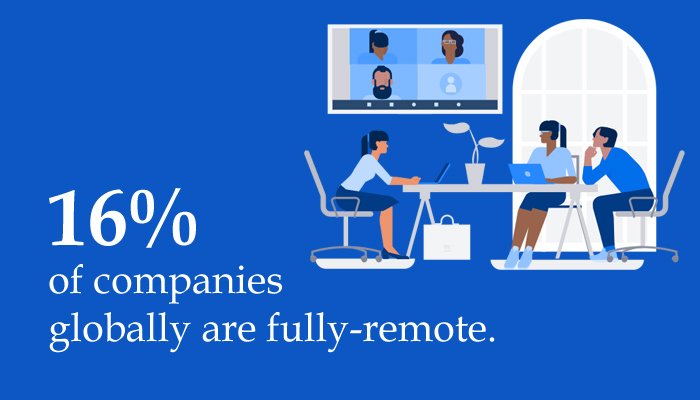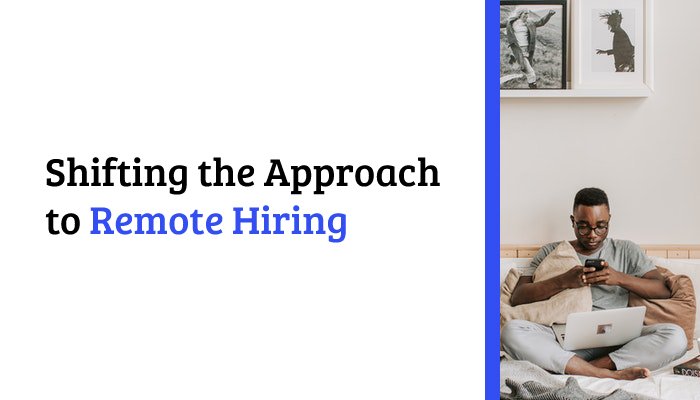8 Red Flags a Candidate Won’t Make a Good Remote Employee

Hiring remotely is something that most businesses have had to do over the past couple of years.
Whether forced to do so out of necessity or as part of an intentional strategic shift toward a hybrid or virtual business model, remote hiring is now a standard part of what it looks like to run a business in the 2020s.
And if you’re serious about successfully hiring the best remote employees with a remote staffing agency, you must have a plan for what to look for. This includes knowing which kind of candidates you do not want.
It’s a Remote World…You’re Just Living In It

Prior to the global pandemic, many companies had dipped their toes into the waters of remote hiring and hybrid workplaces. But once the pandemic hit, nearly everyone was forced to dive in head-first. There was no more playing around – a total plunge was in store.
Fast forward a couple of years and remote working has become the standard in many organizations and industries. Here are some powerful statistics that show the direction things are trending:
- 16 percent of all companies worldwide are 100 percent remote
- 56 percent of companies now allow remote work
- 77 percent of workers say they’re more productive when allowed to work remotely
- 85 percent of hiring managers say having remote teams is becoming the new norm
- 74 percent of workers say they’re less likely to leave a job that allows remote work
According to a McKinsey study, 29 percent of all work in the United States could be done remotely with no loss in productivity. Another 10 percent could be done remotely if needed. Unless your business provides an in-person, hands-on service – like chiropractic services or landscaping – there are opportunities for going virtual. Even healthcare companies (telehealth services) and many food establishments (online ordering and delivery) have made the virtual shift in recent years.
If you haven’t made this shift within your organization, a time is coming when it will be seen as necessary. Not only that, but a failure to adapt by creating and hiring for remote positions could actually put you at a disadvantage.
Learning how to hire for remote positions is something you have to take seriously. With the right focus, you can turn this into a strength for your business.
Shifting the Approach to Remote Hiring

Hiring employees remotely is a totally different animal than hiring in real life (IRL). If you try to copy and paste your IRL approach to remote hiring, you’ll fail miserably. The jobs, skills, and experiences required to be successful in a remote setting are far different than what it takes to be successful in a traditional workplace. You need to shift your approach to find and onboard the best hires for remote positions. Here’s why:
- Limited insights. So much of the interview process is built around studying someone’s body language, listening for their tone of voice, and watching how they interact with various people. When you do an interview remotely, you miss 90 percent of this. Sure, you might get to see their face, but the candidate can basically manipulate and frame their image however they’d like. You miss all of the ancillary details that you would otherwise get to observe when a candidate has to walk into your office, sit in the waiting room, come into the interview room, etc.
- Awkwardness. Even after more than two years of using Zoom and participating in remote meetings, there’s still a level of awkwardness that exists in virtual interviews. Whether it’s video lagging, muted mics, or talking over one another, these interviews never go as smoothly as either party would like.
- Limited experience. The candidate doesn’t get nearly the same interview experience as they would if they were being interviewed in your actual office. They miss out on experiencing the company culture, interacting with other employees, etc. This makes it more challenging to sell the candidate on your company.
- Different soft skills. A remote hire might require the same technical skills as an in-office hire, but the soft skill requirements are different. If you use the same IRL approach, you run the risk of hiring someone who isn’t right for the position.
This is just a surface-level look at some of the unique differences that exist in the remote hiring process. There are dozens of other factors at play. And no matter which way you slice it, you can’t continue to use the same IRL hiring strategy. You must evolve your approach. This means looking for signs that someone is a good fit for remote work, as well as red flags that indicate someone isn’t cut out for this type of position.
8 Red Flags That You Should Steer Clear Of
As you vet candidates for remote positions, here are some red flags you should avoid at all costs:
1. Poor Written Communication
Pay close attention to the candidate’s communication in the days leading up to the interview.
- How well do they communicate via email?
- Do they use clear language when writing emails, or is it difficult to discern the message?
- Are they quick to respond via email, or does it take several days?
- Do they use proper grammar, spelling, and sentence structure?
Even with phone and video conferencing tools, so much of the communication in a remote position is written. If someone has poor written communication skills, they’ll make everyone’s life a nightmare.
Good written communication is clear and succinct. You want to hire people who have an intuitive understanding of how to communicate clearly. If someone writes 400-word paragraphs in their emails and doesn’t know how to embed a hyperlink, that’s a problem. And if the candidate isn’t responsive with SMS or isn’t comfortable using a platform like Slack, take this into account.
This isn’t to say you can’t teach an employee how to improve their communication skills, but do you really want to spend your time coaching someone up on small details like this when there are plenty of candidates out there who already have these skills mastered?
2. Poor Verbal Communication
When it comes to the video interview, focus on their verbal communication. Are they direct, confident, and easy to understand? Again, signs of poor communication on this front will create confusion and difficulty down the road.
Verbal communication skills are especially important if you’re hiring someone in a customer-facing position. Your brand image is extremely important. And in a virtual marketplace, verbal communication between your employees and your customers/partners goes a long way in establishing this image.
3. Technical Difficulties
Everyone has genuine technical difficulties from time to time. However, pay attention to the candidate’s internet connection, video quality, and audio quality. If they have a bad tech setup, this is a warning sign that they might not be cut out for a remote position that requires up-to-date technology.
4. Unprofessional Virtual Setup

In addition to internet, video, and audio, pay attention to the candidate’s remote office. Check out their background and study their physical environment. Is it a mess? Is it organized? Does it look like they have a dedicated, private office, or are they in their kitchen or living room? You can’t always control where a remote employee works, but it’s nice to know they have a focused environment.
5. Asking the Wrong Questions
Pay attention to the types of questions candidates ask you during a remote interview. Thoughtful and discerning questions are a good sign. However, here are some red flag questions to make note of:
- Do I have to clock in at a certain time each morning?
- How do you track my time and work?
- Will I be reporting to anyone on a daily basis?
- How strict is your absenteeism policy?
- How many vacation days do I get?
On the surface, these might not seem like terrible questions. However, if you get too many of these types of questions, it’s an indication that the candidate is someone who likes to toe the line and get away with minimal work.
6. Asking No Questions at All
If you go through an entire interview and the candidate doesn’t ask you any questions, this is a red flag. (It might even be a bigger red flag than if the candidate is asking the wrong questions.)
When an employee fails to ask questions, it can signal any number of things. First off, it signals indifference or a lack of interest. If the employee doesn’t have questions, it means they aren’t very inquisitive about the position. This is a bad sign. Secondly, a lack of questions might signal that the candidate is underqualified and overwhelmed. In other words, they aren’t asking questions because they don’t know what to ask.
7. No Previous Remote Working Experience
We’re going to stop just shy of saying someone must have remote working experience in the past in order to be a viable candidate for a remote opening. However, it’s highly recommended.
Everyone thinks they want to work remotely. And most people assume they’d be pretty good at it. But there’s a big difference between thinking and knowing. Once people are thrown into a remote position, they often discover just how different the experience is. From managing your time and workload to the lack of in-person socialization, it’s a totally different ballgame. You’d rather someone figure out whether or not remote working is a good fit for them on another employer’s dime. You’ll save yourself a lot of trouble (and high turnover) if you seek out candidates with previous remote working experience on their resumes.
8. Poor Internet Presence
As soon as you hire someone, they become a representation of your brand. In the internet age, where everything is shared online, you can’t afford to have people compromising your image in such a public way.
Take some time to do a little investigative work on any candidates who you’re giving serious consideration to in the hiring process.
Tools like Google, Facebook, Instagram, and LinkedIn are your friends here.
You want to study how they carry themselves and be on the lookout for any major red flags that might indicate a poor culture fit.
Staff Your Remote Team With Recruiters.co
At Recruiters.co, we specialize in helping companies adapt to the remote era by providing world-class, cutting-edge staffing services that identify, evaluate, and eventually help hire the right professionals for the job. Want to learn more about how we deliver top talent? Contact us today!
- Mastering Internal Mobility: A Comprehensive Guide to Success - August 10, 2023
- Effective Recruiting Strategies in a Competitive Sales Labor Market - July 27, 2023
- 6 Essential Factors to Attract Top Talent - July 19, 2023
